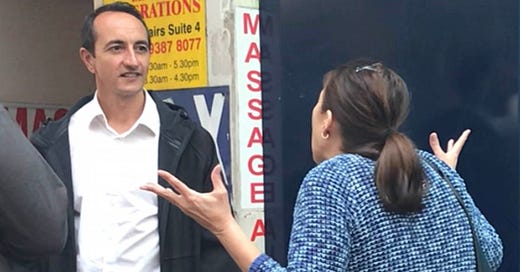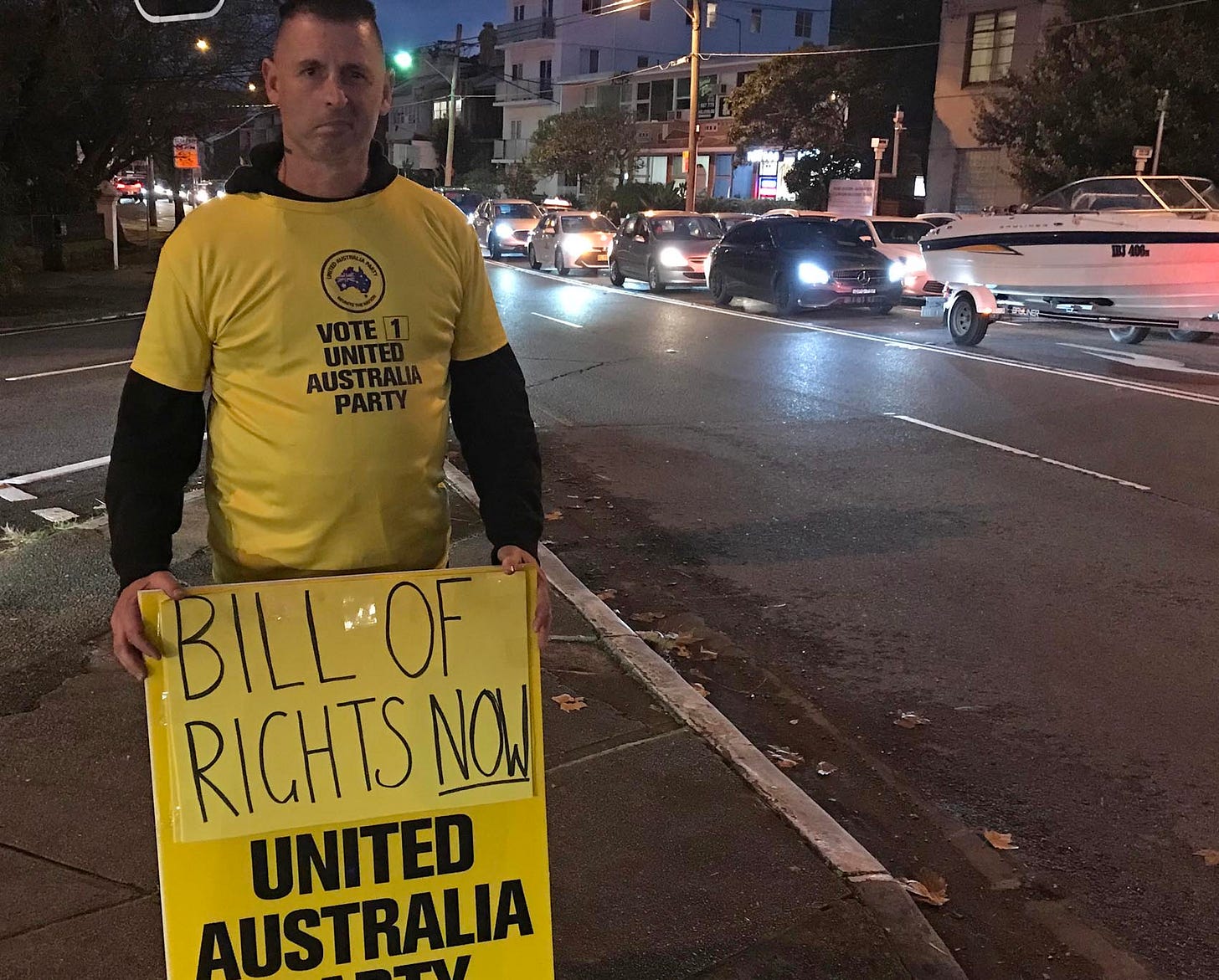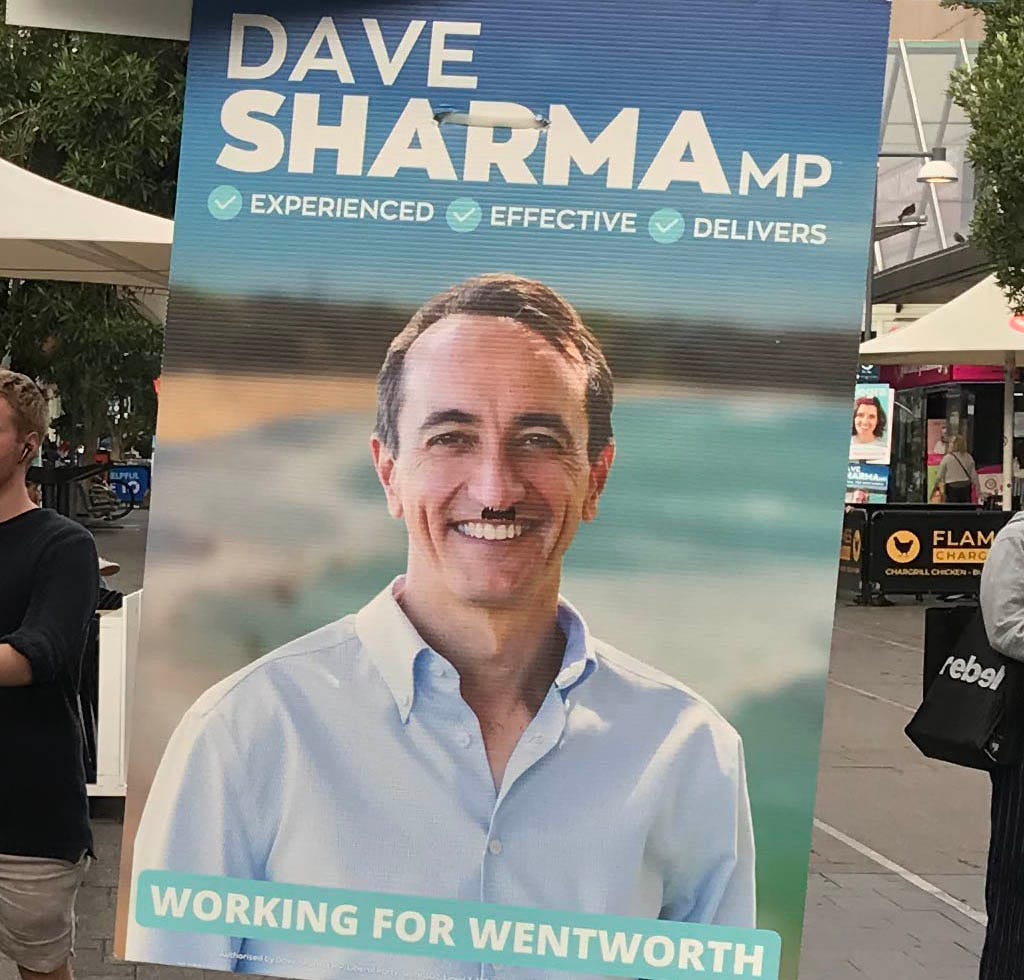Election FURY: day of reckoning on vaccine mandates, lockdowns for major parties
Australia heads to the polls on May 21 for a federal election. Voters are upset that their concerns about covid fascism are being ignored and are turning to minor parties
Elections in Australia are like a storm on a reef. The winds rage, the waves crash. Beneath the surface, the fish waft about five centimetres in either direction. They barely notice.
No matter which party wins, it’s almost the same.
But this time, people are really angry. They were betrayed by the major parties. They were forced to inject a poorly-tested medical product under threat of their jobs.
People who refused were ruined and segregated with Jim Crow cruelty into vaccinated and unvaccinated, set against each other by the state to coerce them into taking a mediocre treatment with serious side effects.
Punitive lockdowns destroyed savings, hopes, dreams and lives.
The data soon showed that covid was not sufficiently deadly to warrant such an extreme response. The risk was overwhelmingly skewed to the elderly and obese.
The covid vaccine should have been a personal medical choice based on individual need when it became clear the product only works for a few months and does not slow the spread. It was already known in early 2021 that it was not needed by healthy young people or those who had the virus and recovered.
One might have expected opposition from one of the two major parties in an adversarial parliament. But the Liberal-National Coalition and Labor agreed on almost everything including forced injections, arguing only the details.
Labor: mandate openly, but pay people $300. Get the unions to push the vax.
Coalition: mandate – but pretend it’s a choice. Get the corporations to enforce it.
So now Australians get to have their say at a federal election on May 21, and a lot of people want their grievance aired.
But the corporate media and major parties are not talking about it - and that makes people even angrier.
Ordinary people who once voted Lib/Lab/Nats/Greens have been stung enough to join new parties like mining magnate Clive Palmer’s United Australia Party, and hold signs at busy intersections breathing car fumes for hours at night.
I asked one in Bondi Junction why he didn’t just go talk to people in the Mall.
“Because someone will rip down the signs,” he said.
At the Oxford St Mall, someone had scribbled a Hitler moustache on a Dave Sharma poster.
The Member for Wentworth, first name Devanand, has hidden the Liberal Party branding on his posters, a sure sign the party knows that people are angry.
It almost makes him seem like an independent. His picture huddled affably with independent Allegra Spender’s: colour-matched, almost camouflaged.
The lip squiggle could be offensive as Mr Sharma was previously Ambassador to Israel, however it is more likely to be a naughty kid or a ticked-off member of the public who blames the Liberals for the covid tyranny.
Benito Mussolini wrote that fascism was the merger of corporate and state power.
“For Fascism the State is absolute, individuals and groups relative. Individuals and groups are admissible in so far as they come within the State,” he wrote in the Doctrine of Fascism, 1932.
Australians tasted this in 2021 and did not like it.
One angry woman confronted Mr Sharma.
Her mother had died from a lack of routine care during the covid lockdowns, she said, adding that the covid response was fascism, and asking Mr Sharma why he hadn’t spoken out against it.
“The mainstream media won’t report that there are people like me who are angry, who are genuinely angry about what all the majors have been doing,” she said.
It’s difficult to know whether the woman was a party operative or a member of the public passing by – elections are full of skulduggery.
But her point was valid.
The companies are becoming “the state”, and you don’t get to oppose their product. Liberal and Labor were all for it, and now they don’t want to talk about it.
The only discussion comes from minor parties, independents and politicians who had the gumption to turn their backs on their party machines and leave.
These brave people are treated like weirdoes by corporate media and demonised as “anti-vaxxers” as if they are against all vaccines, all the time.
Candidate Craig Kelly quit the Liberal Party because of the medical fascism.
On May 4, he told a forum in Sydney that the government had violated basic human rights by allowing employers to blackmail workers by threatening jobs over jabs.
The Guardian made him sound like a mad curiosity making odd “claims”.
“Several people in the audience walked out, while other panel members looked perplexed,” The Guardian reported.
How strange. That’s not an election issue, because – why?
“The Labor candidate, Riley Campbell, suggested voters had much greater concerns,” The Guardian continued.
Well he would, wouldn’t he? Labor force-injected people, too.
Unions also betrayed their members to force the medical product on workers, provoking orange-vest protests outside CFMEU union headquarters in Melbourne.

In 2021, individuals and small business were crushed while large corporations prospered. They continue to enforce the jab mandates on behalf of the state. People lost the ability to freely make medical decisions over their own bodies. Doctors were threatened with regulatory action if they spoke against the vaccines, and forced to take them. The major parties and bureaucracy grovelled before Big Pharma.
Scott Morrison’s Coalition Government threw more than $12 billion at pharmaceutical corporations for covid vaccines and treatments while suppressing cheap alternatives.
Former Labor Prime Minister Kevin Rudd wrote a letter last June to advise he personally lobbied Pfizer boss Albert Bourla to bring forward delivery of his poorly-tested covid injection and to angle for a large-scale advance order of the 2022 booster.
The Federal Government signed away Pfizer’s legal liability for its covid injectable, but it deserved no such trust. Pfizer was convicted of criminal fraud in 2009. When Pfizer was told its subcontractor Ventavia had dirtied up a covid vaccine trial by unblinding it and falsifying data, Pfizer simply re-hired them.
Pfizer refused to release the full raw data from its vaccine trials. Australia’s regulator, the TGA, trusted Pfizer’s report of its own data when reviewing the vaccine’s safety, like marking your own homework. After unsettling reports in the British Medical Journal, the TGA had to ask Pfizer for more information.
New data is coming out all the time (ordered by a Texas court), about the problems with the Pfizer vaccine and its testing - yet Australia’s mandates are still in force.
Corporations want “favoured status” for this reason: big contracts, protection and favourable regulation. They spend a lot of money and time grooming the bureaucracy, regulators and elected members, including through industry groups and lobby firms.

They hire former departmental staff, former regulators, party heavyweights, politicians and their advisers to advocate for them, exploiting relationships and insider know-how. They appoint them to their boards when they leave office.
Insiders foster corporate relationships for influence, with an eye to when they might leave government for plum corporate jobs, board positions, consultancies and paid lobbying. And they all want to be seen as “pro-business”
Close relationships with industry have been encouraged for years as good for growth.
The last one to really “crash through or crash” was Gough Whitlam.
Since then, if you please the big corporations, you flourish.
The “national interest” is a lot like the “national economic interest” which is almost the same as the “corporation’s interest”. By chance, that all coincides with “my future career interest”.
This is a systemic, cultural problem.
It’s caused by career progression that rewards conflict-of-interest decision-making across the major parties, departments, bureaucracy, regulators and even the universities.
It’s not the first time
A story from mining shows how interconnected the politicians, bureaucrats and corporations have become. They are all now “the state”.
In the early 2000s, energy firm Woodside Petroleum inserted itself into border negotiations between Australia and East Timor in order to get what it wanted for its Greater Sunrise gas project in the Timor Sea, at the expense of the Timorese.
Woodside wanted the gas piped south to Darwin where joint-venture partner ConocoPhillips had a gas plant. East Timor wanted it sent north for much-needed jobs, training, roads and development.
Australia’s best interest was a warm friendship with a prosperous East Timor resistant to Chinese overtures. The impoverished nation sits strategically on our vulnerable northern border, useful for defence.
Instead, Australia damaged the relationship by taking up Woodside’s cause.
Woodside was allowed to review treaty drafts, make recommendations and have its “stakeholder” voice heard with Commonwealth officials, according to a DFAT analysis quoted by academic Clinton Fernandes in a 2020 Parliamentary submission.
That this impropriety was ever tolerated shows that decades of close links with industry (“good for the economy”) led to a confusion of “Woodside’s interest” with “national interest”.
The responsible minister, Alexander Downer (Liberal), told Four Corners that Woodside’s investment would have been “wealth for Australians”, saying: “The Australian government unashamedly should be trying to advance the interests of Australian companies.”
But is Woodside “Australian”?
It is listed on the ASX, but the top 10 shareholders are global banks, with HSBC at number one with a 26.8 percent stake, followed by JP Morgan, then Citicorp, National Nominees and French bank BNP Paribas. As of Thursday, they own 57.6 per cent of the company according to Market Index.

The Timorese found out Australia bugged its delegation during the negotiations, resulting in years of litigation. Australia’s betrayal undermined diplomacy in a region that will never forget it.
Instead of fixing the mistake, the Federal Government spent the last decade persecuting the barrister who acted for East Timor, Bernard Collaery, a former ACT attorney general and honourable man of the law. They dragged him through secret court trials that couldn’t be reported on due to “national security” and sent ASIO to raid his home office in Canberra during Timor’s court case against Australia.
The whole episode was a disaster - but many of those involved walked through the revolving door between industry and government.
As Professor Fernandes writes:
“Brendan Augustin was an officer of the Department of Foreign Affairs and Trade, then Woodside’s general manager Timor-Leste from June 2009 to December 2012, and then became Woodside’s international relations manager. John Prowse was a DFAT officer from February 2005 to August 2012, then Woodside’s country manager in Timor-Leste from August 2012 to February 2014, and then senior corporate affairs adviser (International and Government Relations) since February 2014. The secretary of the Department of Foreign Affairs and Trade, Dr. Ashton Calvert, retired in 2005 and joined the board of directors of Woodside Petroleum (and Rio Tinto). The responsible minister, Alexander Downer, worked as a lobbyist for Woodside after leaving Parliament in 2008. The one-time national secretary of the Australian Labor Party, Gary Gray was a senior executive at Woodside Energy from 2001 to 2007. He left to contest the 2007 federal elections and later became Australia’s Minister for Natural Resources, Energy, and Tourism.”
– Professor Clinton Fernandes, Foreign investment proposals Submission 7, Senate Economics Committee Inquiry into foreign investment proposals, 16 March 2020.
Former resources minister Ian Macfarlane (Liberal) now sits on the Woodside board.
Is this not the union of corporation and state?
Even Dave Sharma took leave without pay from DFAT to work as legal adviser to foreign minister Alexander Downer during 2004-06, when East Timor was bugged.
He is now the incumbent up for re-election in the Liberal seat of Wentworth.
Ironically, the voters angry with this corporate-state combine have turned to the United Australia Party as an alternative. It is founded by Clive Palmer – a mining magnate.
He is telling everyone what they want to hear, promising things like:
- A 15 per cent export license on iron ore to help pay off the debt
- Abolish HECS debt for students
- No to any vaccine passports or lockdowns.
It is unclear whether he would be any different in office. But at this stage, nobody cares – something must be done about this intolerable situation.
Government must be firmly separated from industry so that “the state” can once again respect the individual rights of the citizenry and serve our interests.
So – what is to be done?
The major parties see us as sheep to get through the gate.
OK, sheep, on May 21 number the boxes any way you want. It’s Democracy Day.
For me, I intend to put the Lib/Lab/Nats/Greens last.
Senate: (white) number at least 12 boxes below the line so the majors don’t get any preferences.
House of Representatives: (green) number every box.
One Nation, The United Australia Party and the Liberal Democrats all oppose the forced vaccination. So does Reignite Democracy Australia and the Informed Medical Options Party, Crikey says.
An unknown independent or micro-party you never heard of is probably better than Lib/Lab/Nats/Greens at this point.
If the independents and small parties get the balance of power, it may weaken the corporate-government machine for a while, and force them to make careful decisions.
The fish will only move about 5cm in either direction – but they might get the message. Perhaps the permanent state might then be called to account.









Sums up my disillusionment with the LNP and why I’ve moved to Pauline Hanson’s One Nation.
Same here in NZ. Many people feel their parties betrayed them, Act & National in particular as they were the opposition - or at least - meant to be. No one knows who to vote for, but everyone knows who they are not going to vote for. When they had the anti-mandate protests in fron of the Beehive not one MP out of 120 went out to talk to us. It will be interesting to see if the main parties here also seek to hide their logos.